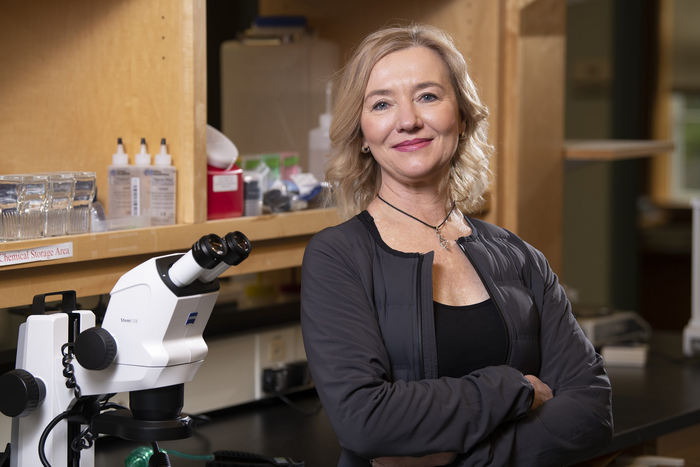Halyna Shcherbata, Ph.D., will lead a new research group at MDI Biological Laboratory, in the Kathryn W. Davis Center for Regenerative Biology and Aging. Shcherbata’s work has focused on regulatory and other roles of non-coding microRNA in gene expression and maintenance, and disorders such as muscular dystrophy and developmental delay. She is already developing new facilities for Drosophila melanogaster fruit flies on campus, returning an esteemed stand-in for human physiology to the Laboratory’s roster of animal models.

Credit: MDI Biological Laboratory
Halyna Shcherbata, Ph.D., will lead a new research group at MDI Biological Laboratory, in the Kathryn W. Davis Center for Regenerative Biology and Aging. Shcherbata’s work has focused on regulatory and other roles of non-coding microRNA in gene expression and maintenance, and disorders such as muscular dystrophy and developmental delay. She is already developing new facilities for Drosophila melanogaster fruit flies on campus, returning an esteemed stand-in for human physiology to the Laboratory’s roster of animal models.
In her new lab on Maine’s Mt. Desert Island, Shcherbata plans initial research on a multi-functional protein, RBFOX-1, that may play an important role in musculaer dystrophies, developmental delay and other disorders as well, such as attention-deficit hyperactivity, autism, and diabetes. RBFOX1 alterations could have a general regulating effect on gene expression, she says, and a better understanding of the relationships between rbfox-1 and microRNA could lead to new therapeutic targets.
“I am very excited about this,” Shcherbata said.
So is the entire MDI Bio Lab community.
“Dr. Shcherbata is doing important, original work on degenerative diseases and gene expression that will complement our faculty’s parallel investigations of aging and regeneration,” said Herman Haller, M.D., MDI Bio Lab’s president. “We are honored to welcome her to campus.”
Shcherbata is a native of Ukraine; she earned her Ph.D. at the Lviv National University of Ivan Franko in 1996. Since then, she’s held positions at the University of Washington, the Max Planck Institute for Biophysical Chemistry in Göttingen, and most recently at Hannover Medical School.
She says the non-profit MDI Bio Lab offers a unique opportunity to perform basic biomedical research in a collegial environment.
“What is unusual about the laboratory is this scholarly atmosphere; there are many amazing people who are genuinely interested in science,” she says. “I had the feeling there that this is not really work. And I love this… it kind of frees your mind. Makes it free to think.”
She will be joined on MDI Bio Lab’s campus by her longtime colleague, Travis Carney, Ph.D., who has taken a full-time postion as Senior Scientist
MDI Bio Lab is a 125-year old, non-profit biomedical research and education center situated on Maine’s rugged coast. It hosts 12 laboratory groups and leads a network of 14 research and educational institutions sharing technology and expertise to train the next generation of bioscience leaders.




